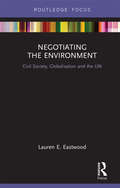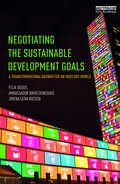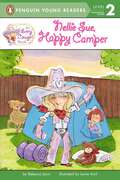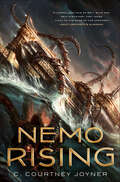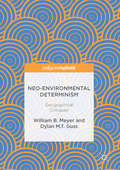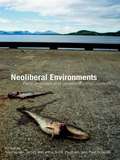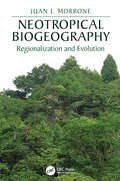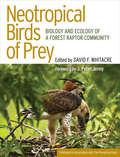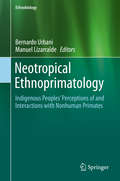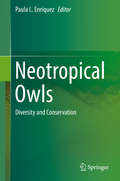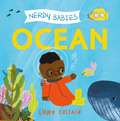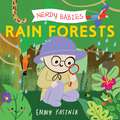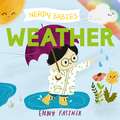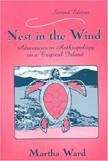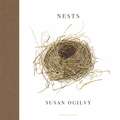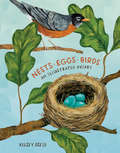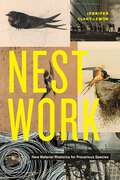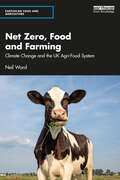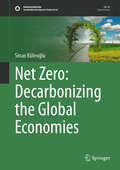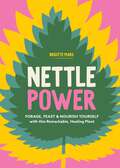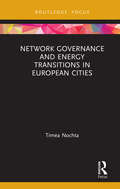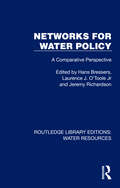- Table View
- List View
Negotiating the Environment: Civil Society, Globalisation and the UN (Routledge Focus on Environment and Sustainability)
by Lauren E EastwoodCivil society participants have voiced concerns that the environmental problems that were the subject of multilateral environmental agreements negotiated during the 1992 Rio processes are not serving to ameliorate global environmental problems. These concerns raise significant questions regarding the utility of negotiating agreements through the UN. This book elucidates the complexity of how participants engage in these negotiations through the various processes that take place under the auspices of the UN—primarily those related to climate and biological diversity. By taking an ethnographic approach and providing concrete examples of how it is that civil society participants engage in making policy, this book develops a robust sense of the implications of the current terrain of policy-making—both for the environment, and for the continued participation of non-state actors in multilateral environmental governance. Using data gathered at actual negotiations, the book develops concepts such as participation and governance beyond theory. The research uses participant observation ethnographic methods to tie the theoretical frameworks to people’s actual activities as policy is generated and contested. Whereas topics associated with global environmental governance are traditionally addressed in fields such as international relations and political science, this book contributes to developing a richer understanding of the theories using a sociological framework, tying individual activities into larger social relations and shedding light on critical questions associated with transnational civil society and global politics.
Negotiating the Sustainable Development Goals: A transformational agenda for an insecure world
by Felix Dodds Ambassador David Donoghue Jimena Leiva RoeschThe Sustainable Development Goals (SDGs) are a universal set of seventeen goals and 169 targets, with accompanying indicators, which were agreed by UN member states to frame their policy agendas for the fifteen-year period from 2015 to 2030. Written by three authors who have been engaged in the development of the SDGs from the beginning, this book offers an insider view of the process and a unique entry into what will be seen as one of the most significant negotiations and global policy agendas of the twenty-first century. The book reviews how the SDGs were developed, what happened in key meetings and how this transformational agenda, which took more than three years to negotiate, came together in September 2015. It dissects and analyzes the meetings, organizations and individuals that played key roles in their development. It provides fascinating insights into the subtleties and challenges of high-level negotiation processes of governments and stakeholders, and into how the SDGs were debated, formulated and agreed. It is essential reading for all interested in the UN, sustainable development and the future of the planet and humankind.
Nellie Sue, Happy Camper: An Every Cowgirl Book (Every Cowgirl)
by Rebecca JanniLike all adventurous cowgirls, Nellie Sue loves to go camping--and it's time to try her skills in the wild outdoors. But, when night falls and the woods come alive with creaking noises, these happy campers aren't so happy anymore! Nellie Sue must use her biggest cowgirl courage to make it through the night with a smile on her face.With playful, simple text and a super sweet ending, this Level 2 reader is a perfect choice for children beginning to read.
Nem todas as espécies envelhecem
by Anca IoviţăO envelhecimento é um enigma a ser solucionado. Esse processo, tradicionalmente, é estudado por meio de alguns modelos biológicos, como a mosca-das-frutas, algumas espécies de nematoides, ratos e camundongos. O que todas essas espécies têm em comum é seu rápido envelhecimento, o que é excelente em termos de orçamento para um laboratório e uma ótima estratégia a curto prazo – quem dispõe do tempo necessário para estudar espécies que vivem por décadas? Mas as diferenças de expectativa de vida de uma espécie para outra são ordens de grandeza maiores do que qualquer variação de expectativa de vida que possa ser observada em laboratório. Foi isso o que me levou a estudar incontáveis fontes de informação numa tentativa de reunir pesquisas altamente especializadas em um livro de fácil compreensão. Queria enxergar a floresta além das árvores. Queria apresentar as diferenças de expectativa de vida entre as espécies por meio de uma sequência lógica e acessível. Este livro é minha tentativa de fazer justamente isso. Quais são os mecanismos subjacentes às diferenças identificadas no processo de envelhecimento entre uma espécie e outra? Escolhi intencionalmente escrever a resposta a essa pergunta em linguagem clara. O envelhecimento é um assunto importante demais para ficar escondido atrás das portas do jargão científico formal. Este livro não existiria se o chá verde, as bibliotecas e a Internet não tivessem sido inventados. Embora a quantidade de dados que pesquisei para identificar os padrões essenciais seja enorme, este livro não é exaustivo. Não se trata de um árido livro acadêmico. Tentei dar vida a um tópico extremamente importante para a extensão da expectativa de vida humana. Apenas você pode decidir se consegui atingir esse objetivo. Índice Enxergando a floresta além das árvores Confiabilidade é importante A matemática do envelhecimento
Nemo Rising
by C. Courtney JoynerAn exciting sequel to the Captain Nemo adventures enjoyed by millions in Jules Verne's 20,000 Leagues Under the Sea.Sea monsters are sinking ships up and down the Atlantic Coast. Enraged that his navy is helpless against this onslaught and facing a possible World War as a result, President Ulysses S. Grant is forced to ask for assistance from the notorious Captain Nemo, in Federal prison for war crimes and scheduled for execution. Grant returns Nemo’s submarine, the infamous Victorian Steampunk marvel Nautilus, and promises a full Presidential pardon if Nemo hunts down and destroys the source of the attacks. Accompanied by the beautiful niece of Grant’s chief advisor, Nemo sets off under the sea in search of answers. Unfortunately, the enemy may be closer than they realize...At the Publisher's request, this title is being sold without Digital Rights Management Software (DRM) applied.
Neo-Environmental Determinism
by William B. Meyer Dylan M.T. GussThis book pulls together major critiques of contemporary attempts to explain nature-society relations in an environmentally deterministic way. After defining key terms, it reviews the history of environmental determinism's rise and fall within geography in the early twentieth century. It discusses the key reasons for the doctrine's rejection and presents alternative, non-deterministic frameworks developed within geography for analyzing the roles played by the environment in human affairs. The authors examine the rise in recent decades of neo-deterministic approaches to such issues as the demarcation of regions, the causes of civilizational collapse in prehistory, today's globally uneven patterns of human well-being, and the consequences of human-induced climate change. In each case, the authors draw on the insights and approaches of geography, the academic discipline most conversant with the interactions of society and environment, to challenge the widespread acceptance that such approaches have won. The book will appeal to those working on human-environmental research, international development and global policy initiatives.
Neoliberal Environments: False Promises and Unnatural Consequences
by Paul Robbins Nik Heynen James McCarthy Scott PrudhamThis volume explores the nexus between nature, markets, deregulation and valuation, using theoretically sharp and empirically rich real-world case studies and analyses of actually existing policy from around the world and across a range of resources. In short, it answers the questions: does neoliberalizing nature work and what work does it do? More specifically, this volume provides answers to a series of urgent questions about the effects of neoliberal policies on environmental governance and quality. What are the implications of privatizing public water utilities in terms of equity in service provision, resource conservation and water quality? Do free trade agreements erode the sovereignty of nations and citizens to regulate environmental pollution, and is this power being transferred to corporations? What does the evidence show about the relationship between that marketization and privatization of nature and conservation objectives? Neoliberal Environments productively engages with all of these questions and more. At the same time, the diverse case studies collectively and decisively challenge the orthodoxies of neoliberal reforms, documenting that the results of such reforms have fallen far short of their ambitions.
Neotropical Biogeography: Regionalization and Evolution (CRC Biogeography Series)
by Juan J. MorroneNeotropical Biogeography: Regionalization and Evolution presents the most comprehensive single-source treatment of the Neotropical region derived from evolutionary biogeographic studies. The book provides a biogeographic regionalization based on distributional patterns of plant and animal taxa, discusses biotic relationships drawn from track and cladistic biogeographic analyses, and identifies cenocrons (subsets of taxa within biotas identified by their common origin and evolutionary history). It includes maps, area cladograms and vegetation profiles. <P><P> The aim of this reference is to provide a biogeographic regionalization that can be used by graduate students, researchers and other professionals concerned with understanding and describing distributional patterns of plants and animals in the Neotropical region. It covers the 53 biogeographic provinces of the Neotropical region that are classified into the Antillean, Brazilian and Chacoan subregions, and the Mexican and South American transition zones.
Neotropical Birds of Prey: Biology and Ecology of a Forest Raptor Community
by David F Whitacre J. Peter JennyUntil recently, surprisingly little has been known about the biology and behavior of tropical forest raptors, including such basic aspects as diets, breeding biology, habitat requirements, and population ecology, information critical to the development of conservation efforts. The Peregrine Fund conducted a significant eight-year-long research program on the raptor species, including owls, in Tikal National Park in Guatemala to learn more about Neotropical birds of prey. Impressive and unprecedented in scale, this pioneering research also involved the development of new methods for detecting, enumerating, and studying these magnificent but often elusive birds in their forest home. Beautifully illustrated with photographs of previously little-known species, the resulting book is the most important single source for information on the lowland tropical forest raptor species found in Central America.Neotropical Birds of Prey covers twenty specific species in depth, including the Ornate Hawk-Eagle, the Barred Forest-Falcon, the Bat Falcon, and the Mexican Wood Owl, offering thorough synopses of all current knowledge regarding breeding biology and behavior, diet, habitat use, and spatial needs. Contributors to this landmark work also show how the populations fit together as a community with overlapping habitat and prey needs that can put them in competition with reptiles and mammalian carnivores as well, yet differ from one another in their nesting or feeding behaviors and population dynamics. The work's substantive original data offer interesting comparisons between tropical and temperate zone species, and provide a basis for establishing conservation measures based on firsthand research. Making available for the first time new data on the biology, ecology, behavior, and conservation of the majestic owls and raptors of the New World tropics, this book will appeal to a wide ornithological readership, especially the many raptor enthusiasts around the world.
Neotropical Ethnoprimatology: Indigenous Peoples’ Perceptions of and Interactions with Nonhuman Primates (Ethnobiology)
by Bernardo Urbani Manuel LizarraldeEthnoprimatology is situated at the intersection between the biological and cultural subfields of anthropology. Research on the interface between human and nonhuman primates has been steadily increasing since 1997, when the term ethnoprimatology was first coined. Although there have been studies on human–nonhuman primate interactions in the tropical Americas, no single comprehensive volume has been published that integrates this information to fully understand it in this region. Eighteen novel chapters written by outstanding scholars with various backgrounds are included in this edited volume. They refer to the complex interconnections between different indigenous peoples with New World monkeys that sympatrically share their ancestral territories. Geographically, the range covers all of the Neotropics, from southern Mexico through northern Argentina. This work includes topics such as primates as prey and food, ethnozoology/ethnoecology, cosmology, narratives about monkeys, uses of primates, monkeys as pets, and ethnoclassification. Multiple views as well as diverse theoretical and methodological approaches are found within the pages. In sum, this is a compendium of ethnoprimatological research that will be prized by anthropologists, ethnobiologists, primatologists, conservationists, and zoologists alike.“This book… provides a historical benchmark for all subsequent research in ethnoprimatology in the Neotropics and beyond.” — Leslie E. Sponsel, University of Hawai´i at Mānoa.
Neotropical Owls
by Paula L. EnriquezThis book presents a comprehensive biological and ecological information about owls in the neotropic area. In addition the book covers topics such as threats and conservation strategies for these nocturnal birds of prey from 18 Neotropical countries. Owls are a good example of diversification processes and have developed evolutionary characteristics themselves. These species are found almost everywhere in the world but most of them are distributed in tropical areas and about a third of them live in the Neotropics. This biogeographic region has a high biodiversity and even share lineages of species from other continents because at some point all were part of Pangea. Although we still have much to know and understand about this diverse, scarcely studied and threatened group this work aims to be a precedent for future and further research on the subject.
Nerdy Babies: Ocean (Nerdy Babies #1)
by Emmy KastnerNerdy Babies is a new series that will ignite curiosity in even the youngest readers and encourage them to ask questions and explore the world around them.In Nerdy Babies: Ocean, follow our intrepid infants into the watery depths. Check out animals, plants, and fish that live in the ocean. Plus, learn about the unique ecosystem in this simple text written in question and answer format. With bright artwork by Emmy Kastner, this will be a book that the very littlest nerds will want to return to again and again. Stay curious. There’s more to learn about everything!
Nerdy Babies: Rain Forests (Nerdy Babies)
by Emmy KastnerIn Nerdy Babies: Rain Forests, follow our intrepid babies on an adventure into the depths of the rain forest. Take a peek into the dense foliage and uncover the millions of plants and animals that live inside. Plus, learn how to tell the difference between the kinds of rain forests—temperate and tropical—in this simple text written in question-and-answer format.With bright artwork and an engaging design, Nerdy Babies is a series that the very littlest nerds will want to return to again and again.Stay curious. There’s more to learn about everything!
Nerdy Babies: Weather (Nerdy Babies #4)
by Emmy KastnerNerdy Babies is a series that will ignite curiosity in even the youngest readers and encourage them to ask questions and explore the world around them. In Nerdy Babies: Weather, follow our intrepid babies into the eye of the storm. Experience sunshine, wind, rain, and other weather patterns. Plus, learn about how we predict the weather in this simple text written in question and answer format. With bright artwork by Emmy Kastner, Nerdy Babies is a series that the very littlest nerds will want to return to again and again. Stay curious. There’s more to learn about everything!
Nest in the Wind: Adventures in Anthropology on a Tropical Island (2nd Edition)
by Martha WardDuring her first visit to the beautiful island of Pohnpei in the middle of the Pacific Ocean, anthropologist Martha Ward discovered people who grew quarter-ton yams in secret and ritually shared a powerful drink called kava. She managed a medical research project, ate dog, became pregnant, and responded to spells placed on her. Thirty years later she returned to Pohnpei to learn what had happened there since her first visit. Were islanders still casual about sex? Were they still obsessed with titles and social rank? Was the island still lush and beautiful? Had the inhabitants remained healthy? This second edition of Ward's best-selling account is a rare, longitudinal study that tracks people, processes, and a place through decades of change. It is also an intimate record of doing fieldwork that immerses readers in the sights, smells, tastes, sounds, and the sensory richness of Pohnpei. Ward addresses the ageless ethnographic questions about family life, politics, religion, traditional medicine, magic, and death together with contemporary concerns about postcolonial survival, the discontinuities of culture, and adaptation to the demands of a global age. Her discoveries illuminate the evolution of a culture possibly distant from yet important to people living in other parts of the world.
Nests
by Susan OgilvyAn exquisitely illustrated, one-of-a-kind celebration of the hidden beauty of nature and the ingenuity of birdsSusan Ogilvy started painting bird nests almost by accident. One day, while tidying up her garden after a storm, she found a chaffinch nest - a strange, sodden lump on the grass under a fir tree. She carried it inside and placed it on a newspaper; over the next few hours, as the water drained out of it, the sodden lump blossomed into a mossy jewel. She was amazed, and dropped everything to make a painting of the nest at exact life size.This was the start of an obsession; Ogilvy has since painted more than fifty bird nests from life, each time marvelling at its ingenious construction. Every species of bird has its own vernacular, but sources its materials - most commonly twigs, roots, grasses, reeds, leaves, moss, lichen, hair, feathers and cobwebs, less usually, mattress stuffing and string - according to local availability. Ogilvy would, of course, never disturb nesting birds; instead she relies upon serendipity, which is why all her nests have either been abandoned after fulfilling their purpose, or displaced by strong winds.Although Nests showcases the specimens she has found near her homes in Somerset and on the Isle of Arran, its subject matter is by no means only British, since these same birds can be found all over Europe, Scandinavia and as far afield as Russia, Turkey and North Africa. This wondrous book is all the more special for its rarity. Few modern books exist specifically on the subject of bird nests; the most recent among the author's reference works was published in 1932. Exquisitely designed and packaged, Nests will be an essential addition to the libraries of all nature lovers.
Nests, Eggs, Birds: An Illustrated Aviary
by Kelsey OseidDiscover the world's birds, their homes, and their eggs in this gorgeously illustrated, entertaining, and educational guide.Did you know that the tailorbird "sews" leaves together to make its nest? Or that hummingbird eggs are the size of jellybeans? Birds are some of the world's most beautiful and interesting creatures, and their nests and eggs are no exception, displaying a stunning diversity of shapes, sizes, functions, and materials. In Nests, Eggs, Birds, celebrated artist and author Kelsey Oseid explores the fascinating ins and outs of where and how dozens of avian species--robins, birds of paradise, crows, owls, penguins, and more--make their homes and lay their eggs. Full of striking naturalistic art and fun scientific facts, Nests, Eggs, Birds will delight bird lovers of all ages.
Nests: Fifty Nests and the Birds That Built Them
by Sharon BealsSharon Beals' gorgeous photographs of nests offer a new window onto the life and beauty of birds. Drawn from the collections of the California Academy of Sciences, the Museum of Vertebrate Zoology at UC Berkeley, and the Western Foundation of Vertebrate Zoology, these birds' nests from around the world offer astonishing insight into the intricate detail wrought by nature's most fastidious architects. Lovely images of nests and eggs are set against rich black backgrounds, and are accompanied by fascinating and informative portraits--conveyed through words and illustrations--of the birds that built them. A beautiful volume, Nests is the perfect gift for birders, bird lovers, and anyone captivated by the fleeting and fascinating splendor of the natural world.
Nestwork: New Material Rhetorics for Precarious Species (RSA Series in Transdisciplinary Rhetoric)
by Jennifer Clary-LemonAs more and more species fall under the threat of extinction, humans are not only taking action to protect critical habitats but are also engaging more directly with species to help mitigate their decline. Through innovative infrastructure design and by changing how we live, humans are becoming more attuned to nonhuman animals and are making efforts to live alongside them.Examining sites of loss, temporal orientations, and infrastructural mitigations, Nestwork blends rhetorical and posthuman sensibilities in service of the ecological care. In this innovative ethnographic study, rhetorician Jennifer Clary-Lemon examines human-nonhuman animal interactions, identifying forms of communication between species and within their material world. Looking in particular at nonhuman species that depend on human development for their habitat, Clary-Lemon examines the cases of the barn swallow, chimney swift, and bobolink. She studies their habitats along with the unique mitigation efforts taken by humans to maintain those habitats, including building “barn swallow gazebos” and artificial chimneys and altering farming practices to allow for nesting and breeding. What she reveals are fascinating forms of rhetoric not expressed through language but circulating between species and materials objects.Nestwork explores what are in essence nonlinguistic and decidedly nonhuman arguments within these local environments. Drawing on new materialist and Indigenous ontologies, the book helps attune our senses to the tragedy of species decline and to a new understanding of home and homemaking.
Net Zero, Food and Farming: Climate Change and the UK Agri-Food System (Earthscan Food and Agriculture)
by Neil WardThis book examines the implications of the net zero transition for food and farming in the UK and how these can be managed to avoid catastrophic climate change in the crucial decades ahead. For the UK to meet its international obligations for reducing greenhouse gas emissions, nothing short of a revolution is required in our use of land, our farming practices and our diet. Taking a historical approach, the book examines the evolution of agriculture and the food system in the UK over the last century and discusses the implications of tackling climate change for food, farming and land use, setting the UK situation in an international context. The chapters analyse the key challenges for this transition, including dietary change and food waste, afforestation and energy crops, and low-emission farming practices. This historical perspective helps develop an understanding of how our food, farming and land use system has evolved to be the way that it is, and draws lessons for how the agri-food system could evolve further to support the transition to net zero and avoid catastrophic climate change. Written in a clear and accessible style, this book will be essential reading to students and scholars of food, agriculture and the environment, as well as policymakers and professionals involved climate change policy and the agriculture and food industry.
Net Zero: Decarbonizing the Global Economies (Sustainable Development Goals Series)
by Sinan KüfeoğluThis monograph is designed to provide a comprehensive and accessible reference to Net Zero efforts globally. Firstly, the book explains the basics of Net Zero, Greenhouse Gas Emissions (GHG), and the global climate change struggle. A chapter on Environmental, Social, and Governance (ESG), as standardisation and screening of sustainability follows. Next comes a chapter on carbon pricing and carbon tax. After these background chapters, the book continues with eight chapters that cover Net Zero across a variety of economic sectors: energy supply, business sector, transport, residential, industrial processes, waste management, public (and government), and agriculture, forestry and land use. These economic sectors are adopted from the Intergovernmental Panel on Climate Change (IPCC) and UK National Statistics. Each chapter includes basic background information, technical or scientific, and a policy section. The sector-based chapters also include sectoral emissions analysis, review, and then a horizon scanning for innovative companies and their business models. This will enable non-experts from the business sector to read and understand the dynamics and trends in other sectors. Similarly, students and fresh graduates will easily follow the chapter (or the industry) that interests them and comprehend the basics and contemporary business trends. By joining research work with the business models of 400 noteworthy and innovative companies, this book constructs a vital bridge between academia, practical reality, policy, and business implementation, with a keen focus on environmental value.
Nettle Power: Forage, Feast & Nourish Yourself with This Remarkable Healing Plant
by Brigitte MarsA colorful, highly accessible guide to the healing and culinary uses of nettle, a protein-packed wild plant that is a favorite of foragers and herbalists.Nettle Power is a fascinating exploration of the many uses of nettle for food, medicine, and fiber. A plentiful wild plant with a long history of use by both European and Native American herbalists, nettle helps soothe skin conditions, strengthen bones, increase milk production in lactating mothers, restore the nervous system, purify the blood, and boost the immune system, among its many benefits. The plant's sting is easily neutralized by blanching and author Brigitte Mars shares a range of recipes for using the nutrient-dense green leaves as a tasty substitute for spinach or chard in salads, soups, and main dishes, along with healing recipes for teas, tinctures, juices, and elixirs. Colorful illustrations and curious facts and lore make this a highly browsable and useful handbook for foraging, herb, and natural health enthusiasts.
Network Governance and Energy Transitions in European Cities (Routledge Focus on Energy Studies)
by Timea NochtaThis book investigates and evaluates the opportunities and limitations of network governance in building local capacity for energy infrastructure governance. Presenting a comparative analysis of three city cases from across Europe- Birmingham, Frankfurt and Budapest- this book demonstrates how local factors shape the prospect of network governance to support low-carbon energy transitions. It maps out existing governance networks, highlighting the actors involved and their interactions with one another, and also discusses the role and embeddedness of networks in the urban governance of low-carbon energy. Drawing on case study evidence, Nochta develops a comparative analysis which discusses the intricate connections between network characteristics, context and impact. It highlights that organisational fragmentation; the complexity of the low-carbon energy problem and historical developments all influence network characteristics in terms of degree of integration and vertical (hierarchical) power relationships among network actors. Overall, the book concludes that understanding such links between context and networks is crucial when designing and implementing new governance models aimed at facilitating and governing low-carbon urban development. Low-Carbon Energy Transitions in European Cities will be of great interest to scholars of energy policy, urban governance and sustainability transitions.
Networks for Water Policy: A Comparative Perspective (Routledge Library Editions: Water Resources)
by Hans Bressers Jeremy Richardson Laurence J. O’Toole JrNetwork models for analysing public policy have become widely used in recent years. This volume, originally published in 1995, assesses the network idea by applying a common perspective on network analysis to the constellations involved in water policy formation and implementation in England and Wales, Germany, Hungary, the Netherlands, the USA and at the level of the EU. Water policy – addressing basic human needs for the supply of adequate surface and groundwater as well as for the maintenance and improvement of water quality, is an increasingly salient subject. Each case covered in this volume treats the issues of water policy network composition and structure, and determinants of network characteristics, as well as documenting the influence of the networks on policy developments towards more network openness, emulation of business behaviour nd less domination by traditional professional groups such as engineers. Essays by the editors provide a common analytical perspective and offer both explicitly-comparative conclusions and evidence-based assessments of the strengths and limitations of the network perspective.
